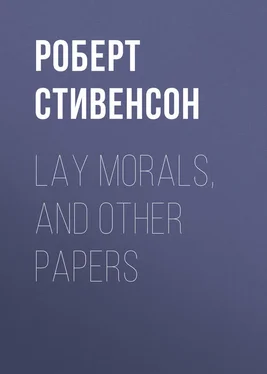Роберт Стивенсон - Lay Morals, and Other Papers
Здесь есть возможность читать онлайн «Роберт Стивенсон - Lay Morals, and Other Papers» — ознакомительный отрывок электронной книги совершенно бесплатно, а после прочтения отрывка купить полную версию. В некоторых случаях можно слушать аудио, скачать через торрент в формате fb2 и присутствует краткое содержание. Жанр: literature_19, foreign_antique, foreign_prose, essays, на английском языке. Описание произведения, (предисловие) а так же отзывы посетителей доступны на портале библиотеки ЛибКат.
- Название:Lay Morals, and Other Papers
- Автор:
- Жанр:
- Год:неизвестен
- ISBN:нет данных
- Рейтинг книги:3 / 5. Голосов: 1
-
Избранное:Добавить в избранное
- Отзывы:
-
Ваша оценка:
- 60
- 1
- 2
- 3
- 4
- 5
Lay Morals, and Other Papers: краткое содержание, описание и аннотация
Предлагаем к чтению аннотацию, описание, краткое содержание или предисловие (зависит от того, что написал сам автор книги «Lay Morals, and Other Papers»). Если вы не нашли необходимую информацию о книге — напишите в комментариях, мы постараемся отыскать её.
Lay Morals, and Other Papers — читать онлайн ознакомительный отрывок
Ниже представлен текст книги, разбитый по страницам. Система сохранения места последней прочитанной страницы, позволяет с удобством читать онлайн бесплатно книгу «Lay Morals, and Other Papers», без необходимости каждый раз заново искать на чём Вы остановились. Поставьте закладку, и сможете в любой момент перейти на страницу, на которой закончили чтение.
Интервал:
Закладка:
So far of Respectability; what the Covenanters used to call ‘rank conformity’: the deadliest gag and wet blanket that can be laid on men. And now of Profit. And this doctrine is perhaps the more redoubtable, because it harms all sorts of men; not only the heroic and self-reliant, but the obedient, cowlike squadrons. A man, by this doctrine, looks to consequences at the second, or third, or fiftieth turn. He chooses his end, and for that, with wily turns and through a great sea of tedium, steers this mortal bark. There may be political wisdom in such a view; but I am persuaded there can spring no great moral zeal. To look thus obliquely upon life is the very recipe for moral slumber. Our intention and endeavour should be directed, not on some vague end of money or applause, which shall come to us by a ricochet in a month or a year, or twenty years, but on the act itself; not on the approval of others, but on the rightness of that act. At every instant, at every step in life, the point has to be decided, our soul has to be saved, heaven has to be gained or lost. At every step our spirits must applaud, at every step we must set down the foot and sound the trumpet. ‘This have I done,’ we must say; ‘right or wrong, this have I done, in unfeigned honour of intention, as to myself and God.’ The profit of every act should be this, that it was right for us to do it. Any other profit than that, if it involved a kingdom or the woman I love, ought, if I were God’s upright soldier, to leave me untempted.
It is the mark of what we call a righteous decision, that it is made directly and for its own sake. The whole man, mind and body, having come to an agreement, tyrannically dictates conduct. There are two dispositions eternally opposed: that in which we recognise that one thing is wrong and another right, and that in which, not seeing any clear distinction, we fall back on the consideration of consequences. The truth is, by the scope of our present teaching, nothing is thought very wrong and nothing very right, except a few actions which have the disadvantage of being disrespectable when found out; the more serious part of men inclining to think all things rather wrong , the more jovial to suppose them right enough for practical purposes . I will engage my head, they do not find that view in their own hearts; they have taken it up in a dark despair; they are but troubled sleepers talking in their sleep. The soul, or my soul at least, thinks very distinctly upon many points of right and wrong, and often differs flatly with what is held out as the thought of corporate humanity in the code of society or the code of law. Am I to suppose myself a monster? I have only to read books, the Christian Gospels for example, to think myself a monster no longer; and instead I think the mass of people are merely speaking in their sleep.
It is a commonplace, enshrined, if I mistake not, even in school copy-books, that honour is to be sought and not fame. I ask no other admission; we are to seek honour, upright walking with our own conscience every hour of the day, and not fame, the consequence, the far-off reverberation of our footsteps. The walk, not the rumour of the walk, is what concerns righteousness. Better disrespectable honour than dishonourable fame. Better useless or seemingly hurtful honour, than dishonour ruling empires and filling the mouths of thousands. For the man must walk by what he sees, and leave the issue with God who made him and taught him by the fortune of his life. You would not dishonour yourself for money; which is at least tangible; would you do it, then, for a doubtful forecast in politics, or another person’s theory in morals?
So intricate is the scheme of our affairs, that no man can calculate the bearing of his own behaviour even on those immediately around him, how much less upon the world at large or on succeeding generations! To walk by external prudence and the rule of consequences would require, not a man, but God. All that we know to guide us in this changing labyrinth is our soul with its fixed design of righteousness, and a few old precepts which commend themselves to that. The precepts are vague when we endeavour to apply them; consequences are more entangled than a wisp of string, and their confusion is unrestingly in change; we must hold to what we know and walk by it. We must walk by faith, indeed, and not by knowledge.
You do not love another because he is wealthy or wise or eminently respectable: you love him because you love him; that is love, and any other only a derision and grimace. It should be the same with all our actions. If we were to conceive a perfect man, it should be one who was never torn between conflicting impulses, but who, on the absolute consent of all his parts and faculties, submitted in every action of his life to a self-dictation as absolute and unreasoned as that which bids him love one woman and be true to her till death. But we should not conceive him as sagacious, ascetical, playing off his appetites against each other, turning the wing of public respectable immorality instead of riding it directly down, or advancing toward his end through a thousand sinister compromises and considerations. The one man might be wily, might be adroit, might be wise, might be respectable, might be gloriously useful; it is the other man who would be good.
The soul asks honour and not fame; to be upright, not to be successful; to be good, not prosperous; to be essentially, not outwardly, respectable. Does your soul ask profit? Does it ask money? Does it ask the approval of the indifferent herd? I believe not. For my own part, I want but little money, I hope; and I do not want to be decent at all, but to be good.
CHAPTER IV
We have spoken of that supreme self-dictation which keeps varying from hour to hour in its dictates with the variation of events and circumstances. Now, for us, that is ultimate. It may be founded on some reasonable process, but it is not a process which we can follow or comprehend. And moreover the dictation is not continuous, or not continuous except in very lively and well-living natures; and between-whiles we must brush along without it. Practice is a more intricate and desperate business than the toughest theorising; life is an affair of cavalry, where rapid judgment and prompt action are alone possible and right. As a matter of fact, there is no one so upright but he is influenced by the world’s chatter; and no one so headlong but he requires to consider consequences and to keep an eye on profit. For the soul adopts all affections and appetites without exception, and cares only to combine them for some common purpose which shall interest all. Now, respect for the opinion of others, the study of consequences, and the desire of power and comfort, are all undeniably factors in the nature of man; and the more undeniably since we find that, in our current doctrines, they have swallowed up the others and are thought to conclude in themselves all the worthy parts of man. These, then, must also be suffered to affect conduct in the practical domain, much or little according as they are forcibly or feebly present to the mind of each.
Now, a man’s view of the universe is mostly a view of the civilised society in which he lives. Other men and women are so much more grossly and so much more intimately palpable to his perceptions, that they stand between him and all the rest; they are larger to his eye than the sun, he hears them more plainly than thunder, with them, by them, and for them, he must live and die. And hence the laws that affect his intercourse with his fellow-men, although merely customary and the creatures of a generation, are more clearly and continually before his mind than those which bind him into the eternal system of things, support him in his upright progress on this whirling ball, or keep up the fire of his bodily life. And hence it is that money stands in the first rank of considerations and so powerfully affects the choice. For our society is built with money for mortar; money is present in every joint of circumstance; it might be named the social atmosphere, since, in society, it is by that alone that men continue to live, and only through that or chance that they can reach or affect one another. Money gives us food, shelter, and privacy; it permits us to be clean in person, opens for us the doors of the theatre, gains us books for study or pleasure, enables us to help the distresses of others, and puts us above necessity so that we can choose the best in life. If we love, it enables us to meet and live with the loved one, or even to prolong her health and life; if we have scruples, it gives us an opportunity to be honest; if we have any bright designs, here is what will smooth the way to their accomplishment. Penury is the worst slavery, and will soon lead to death.
Читать дальшеИнтервал:
Закладка:
Похожие книги на «Lay Morals, and Other Papers»
Представляем Вашему вниманию похожие книги на «Lay Morals, and Other Papers» списком для выбора. Мы отобрали схожую по названию и смыслу литературу в надежде предоставить читателям больше вариантов отыскать новые, интересные, ещё непрочитанные произведения.
Обсуждение, отзывы о книге «Lay Morals, and Other Papers» и просто собственные мнения читателей. Оставьте ваши комментарии, напишите, что Вы думаете о произведении, его смысле или главных героях. Укажите что конкретно понравилось, а что нет, и почему Вы так считаете.












